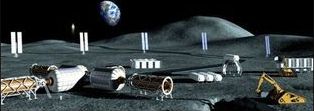In the next decade, designers and consumers will need to radically shift their perspectives on value and commit to a circular economy based on recycling, upcycling, and repurposing what already exists.



But in recent years, Americans — Silicon Valley leaders included — have put too much faith in the private sector to ensure U.S. global leadership in new technology. Now we are in a technology competition with China that has profound ramifications for our economy and defense — a reality I have come to appreciate as chairman of two government panels on innovation and national security. The government needs to get back in the game in a serious way.
We can’t win the technology wars without the federal government’s help.

While robotics and automation create a plethora of opportunities for skilled labor, they substitute many jobs of unskilled labor. Philips’ automated shaver factory in the Netherlands employs one-tenth of the workforce of its factory in China that makes the same shavers. Such developments accentuate inequality and pose severe social pressure in developed countries, which would need to be addressed by government in the years to come.
Technology can complement humans but it can also eliminate their jobs.
Lilac Nachum

This is a guest post by Mohammed Murad, vice president, global sales and business development, Iris ID.
The world is in the grip of a coronavirus epidemic the impact of which extends well beyond people’s health, including more than 1,300 reported deaths. The fear of this recently identified disease has closed businesses and grounded thousands of flights. The impacts have led to estimates of reduced economic growth in many countries.
While the virus that was first discovered in a Chinese province has killed far fewer people than influenza this year, the fatality rate has people worried. Influenza reportedly kills between 10 to 20 people per 100,000 infections each year. The death rate from the coronavirus tops 2,300 deaths per 100,000 cases. Those latter statistics change virtually daily as more cases of the virus are reported.
Never in history have we seen wealth concentrated (Apple is worth over a trillion dollars). Money and congressional power answers why legislators: let drug companies squeeze dollars from sick people, refuse to stop a president who winks and nods at Putin, at right-wing agitators, who stoke bigotry, or singles out Black, Hispanics, Jews, Muslims, immigrants, asylum seekers and refugees (let’s just lump them together). Fear of others comes from seeds planted early in life. Fear is personal — you don’t feel mine, I don’t feel yours.
But, alas, the future will be like nothing we have experienced. It’s a HUUUGE planet, with decades to come, which, if we lived long enough would from today’s vantage be unrecognizable. What we do know from our lives is that we are but a small part, not only small in terms of our kind or beliefs (political, religious, cultural), but small in influence over the planet’s trajectory (war, maybe atomic, population growth, immigration, climate, economy, racial, ethnic composition, e.g., in the U.S.).
Exceptionalism once stood for the idea that Americans served as an example of progressive values (democracy, justice and humanity), control over their destiny; could tame the environment, extract resources (oil, coal) without limit, and provide jobs for everyone through capitalism. For our successors, what they look like and what they believe in will go beyond change wrought by anything imaginable, today.

According to a new study from Oxford Economics, within the next 11 years there could be 14 million robots put to work in China alone.
Economists analyzed long-term trends around the uptake of automation in the workplace, noting that the number of robots in use worldwide increased threefold over the past two decades to 2.25 million.
While researchers predicted the rise of robots will bring about benefits in terms of productivity and economic growth, they also acknowledged the drawbacks that were expected to arise simultaneously.

The space industry is in the midst of a widespread transformation, as the last decade has seen several young, private companies seek to profit in areas historically dominated by governmental interests. Among these areas is lunar mining, which represents a crucial step for the development of the space economy by enabling the utilization of lunar resources. Though significant opportunities exist for wealth creation and societal benefits, it will require sustained multibillion-dollar investment to develop a vibrant lunar mining industry.
Exploration is the essential first step for any mining endeavor, terrestrially or otherwise, but with the technical challenges of lunar mining largely solved, access to capital has become the prevailing constraint. While the uncertainty of operating in space is the commonly used explanation for capital constraints, in reality, terrestrial explorers have seen funding steadily decline for a decade, with investors favoring lower risk, passive exposure to the mining sector. For lunar mining firms seeking to attract capital for exploration, this essay details the incompatibility of traditional investment options, the financing strategies developed by the similarly cash-strapped terrestrial mining industry, and how prospective lunar miners should capitalize on emerging trends in project finance.

Cities change as they grow — not only by adding area or population but also in a variety of other ways, from the length and width of their roads to economic growth to the distribution of elementary schools. Social scientists often clash over the best way to measure change as a city swells. Traditionally, they’ve taken a cross-sectional approach, which means collecting data on a large number of cities of diverse sizes at the same moment in time. More recently, some researcher…
New work reconciles divergent methods used to analyze the scaling behavior of cities.

Every crisis is an opportunity. With everyone staying home, this is the perfect opportunity for e-commerce, e-learning, online jobs, and big tech to expand. This is the beginning of a huge tech revolution. 2020 will be the techade (technology decade).
The virus is hitting China’s economy hard, but this is likely only temporary. China’s immune system is fighting back — building hospitals in record time, completely locking down a city and most importantly the entire nation uniting as one voice of support and solidarity.
Mario Cavolo called out the global response to the Coronavirus in his post “Something’s not right here folks” which originally went viral on LinkedIn and then subsequently all over Chinese social media. He compares the media response to Coronavirus with the H1N1 outbreak in the US, saying, “it’s not a conspiracy, it’s just a tragedy,” and “this vicious, political, xenophobic racist attacks and smearing of all things China needs to stop.”
What doesn’t break you only makes you stronger, and the Chinese people are resilient and will find ways to rise out of this crisis, likely coming back even stronger than before. How long that will take no-one yet knows, but the Chinese spirit is not even close to being broken, and we’ve seen how Chinese ingenuity in a time of crisis has led to entirely new operating models.